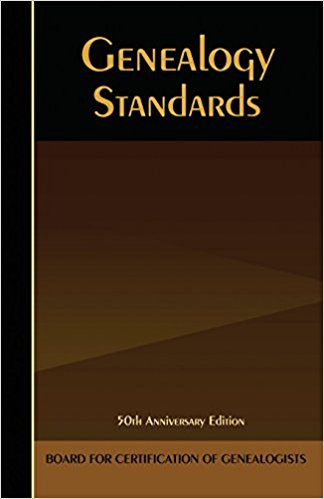from 13 March 2014 on our old blog site
I’m still reading Genealogy Standards. Reading it again is perhaps a more accurate word.
 It is important for those who purchase the book, either as a part of their certification process or just as a part of their own genealogical education, that they remember what the Genealogy Standards is not. It is not a complete how-to book. It is not a list of sources. The Genealogy Standards is a list of benchmarks against which genealogical research is to be measured and compared.
It is important for those who purchase the book, either as a part of their certification process or just as a part of their own genealogical education, that they remember what the Genealogy Standards is not. It is not a complete how-to book. It is not a list of sources. The Genealogy Standards is a list of benchmarks against which genealogical research is to be measured and compared.
It is not a specific how-to guide, but standards guidelines in any profession are not usually how-to guides. That’s what classes and other trainings are for. It’s short and to the point, more in the sense of reminders for what a researcher should be doing instead of a specific list of sources to check.
I don’t read Genealogy Standards with the intent of seeing a list of suggestions that will help me with my Rufus D. Stephens, my Benjamin Butler, or my Hinrich Mueller. However, as I read the standards, particularly the ones in regards to documentation and research, I should be asking myself:
- have I done that when I researched?
- have I analyzed each piece of information that I already have?
- was I thinking about those writing suggestions when I put together a summary of my research?
Patty says:
Thank u for ur in site on this subject and book.
Michele says:
You mention Benjamin Butler in your searches….I am related to and am doing research on the Butler’s, including the “Benjamins”!
I am definitely going to read this book. Although I document my sources, I have never been taught the correct way to analyze or write about them (although I think my research is pretty thorough). Thank you for this post!
mjnrootdig says:
You’re welcome. I’m still looking for Benjamin’s parents…a few good clues, but nothing solid.